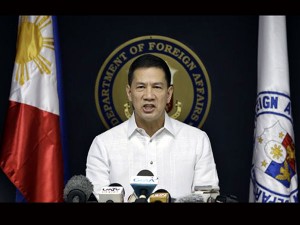DFA keeps cool in face of China’s snub of Aquino
MANILA, Philippines—When Malacañang got word on Wednesday that it was not a “conducive time” to set foot in Chinese soil, President Aquino, who was supposed to attend a trade fair and business conference in the southern Chinese city of Nanning, changed his mind and backed off.
“The President has decided not to proceed to Caexpo (China-Asean Expo), taking into consideration China’s request for him to visit the country at a more conducive time,” said Raul Hernandez, spokesperson of the Department of Foreign Affairs.
But Hernandez clarified that China did not rescind the invitation to the Philippines.
China’s request was relayed to Secretary of Foreign Affairs Albert del Rosario late Wednesday, he said.
Amid China’s apparent snub of President Aquino, Del Rosario is choosing to stay calm.
Article continues after this advertisementDel Rosario yesterday opted to hold back in reacting to China’s decision to virtually uninvite Mr. Aquino from attending the regional trade expo as he still hoped to save the relationship between Manila and Beijing.
Article continues after this advertisementHe admitted, however, that exercising such restraint is tough, considering the gravity of what happened.
“For the sake of preserving our relations with China, I think it is best to limit our remarks to what had previously been stated,” Del Rosario told the Inquirer via text message yesterday.
“As may be evident, we are all having the greatest of difficulties in exercising restraint for what they had done to our President,” said the official.
The President decided on Thursday to call off his daylong visit to China on Sept. 3, Hernandez told reporters in an interview in Malacañang.
“On the part of the Philippines, we will continue to abide by our principled position that bilateral relations can advance despite differences,” said Hernandez.
The Philippines is the host or “country of honor” in this year’s Caexpo, which is held annually in China to promote the building of the China-Asean free trade area.
Hernandez would not second-guess China’s reason for saying that this would not be a conducive time for Mr. Aquino to come to China.
“I think you have to ask China about that,” he said.
Last year, Interior Secretary Mar Roxas led the Philippine delegation to the expo and held a sideline meeting with then Chinese Vice President and now President Xi Jinping. The two leaders were known to have taken “divergent” positions during the meeting.
Hernandez reiterated the government’s position that China should join the country in seeking a diplomatic solution to maritime disputes in the West Philippine Sea (South China Sea).
“We have urged China to consider the rules-based approach to the West Philippine Sea issue. This rules-based approach is a combination of a two-pronged approach, which is advocating the code of conduct on the South China Sea and pursuing the arbitral case with Unclos (United Nations Convention on the Law of the Sea) in order to resolve the maritime dispute,” he said.
“And according to the Chinese ministry, this would be a hard sell for constituents of China at this time,” he added.
The Philippines had applied for its dispute with China to be arbitrated under the Unclos, a 1982 treaty to which the two countries are both signatories. The legal action, now proceeding at The Hague, also seeks to halt Chinese incursions into established Philippine maritime boundaries.
But China has rejected the Philippines’ call for United Nations arbitration, insisting on bilateral negotiations with its smaller neighbor.
China claims all of the West Philippine Sea, up to the coasts of its neighbors. The Philippines has said that China’s claim infringes on its own maritime territory.
Tensions between Manila and Beijing continue as the Philippines pursued its arbitration bid against China to clarify maritime boundaries in the contested waters, a move the country took when previous attempts to peacefully settle the dispute with the Chinese had failed.
Related Story:
